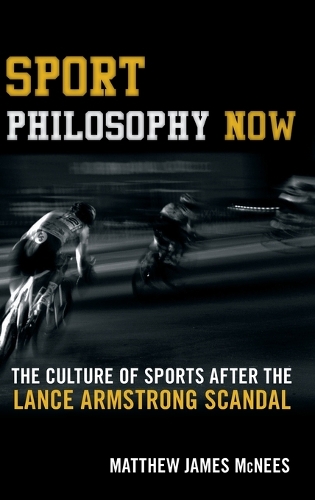
Sport Philosophy Now: The Culture of Sports after the Lance Armstrong Scandal
(Hardback)
Publishing Details
Sport Philosophy Now: The Culture of Sports after the Lance Armstrong Scandal
By (Author) Matthew James McNees
Bloomsbury Publishing PLC
Rowman & Littlefield Publishers
24th December 2015
United States
Classifications
Tertiary Education
Non Fiction
Social and political philosophy
796.01
Winner of Foreword Reviews INDIEFAB Finalist.
Physical Properties
Hardback
288
Width 157mm, Height 238mm, Spine 26mm
572g
Description
In todays media-driven world, it seems there is always a scandal in the news involving athletes. Whether its performance-enhancing drugs in cycling, domestic violence in football, or sexual assault in college athletics, new problems pop up as soon as old issues disappear. As we struggle to understand and, hopefully, correct these problems, we face the difficult reality that the lines between fact and fiction are often blurred by the media, and sports governing bodies can be slow to make the necessary changes in their respective fields. In Sport Philosophy Now: The Culture of Sports after the Lance Armstrong Scandal, Matthew James McNees scrutinizes the current sports philosophy available and updates it in the post-Lance Armstrong age. While many philosophers have turned a blind eye to the realities of sport by focusing on ideologically-driven abstract ideals, this book offers an engaging alternative. Examining the field primarily through the competitive world of cycling, McNees explores such issues as authenticity in sport, our tendency to create superficial high-minded meaning from the actions of athletes, and American capitalism in sports. Other issues discussed include childhood, play, language, and economics. This book critiques the field of sports philosophy from its beginning, offers a new paradigm for the field, explains journalistic mistakes specifically through the lens of the Lance Armstrong scandal, and sheds light on the mysteries of cyclings milieu of governing bodies and influential parties. This book aims to inspire and support those who want to take up rigorous, worthwhile, and difficult questions in the field of sports philosophy. It will be of interest not only to scholars, but also to the cycling community and those who wish to learn more about the interactions between sports, culture, and philosophy.
Reviews
In what he terms the diapsalmata (a term borrowed from Kierkegaard), McNees asserts that the world is at stake in getting the Lance Armstrong scandal right. Basing his argument on Thomas Piketty's Capital in the Twenty-First Century, McNees contends that seeking to punish Armstrong for doping is bad faith. Armstrong was not so much the world's most talented cyclist but the world's most talented means for capital flow in the sport of cycling (quoting from chapter 7). What is required is a new societal paradigm that faces the harsh inequities of the capitalist rhetoric program of manipulating the masses. Armstrong, McNees writes, played a role in producing a socially determined item of consumption as an elite athlete not unlike a horse or a dog, a role that concealed the all-pervasive system of production whose instrument he was. Passionate about his subject, McNees ranges over Hegel, Schopenhauer, Marx, Merleau-Ponty, Sartre, Derrida, Lyotard, Lacan, et al. The Armstrong scandal is a synecdoche for the regime of late capitalism and its stranglehold on the world economic order and on the capacity of humans to understand their manipulation in, for example, the financing of mega-stadiums and elite performances. Summing Up: Recommended. Upper-division undergraduates through faculty and professionals. * CHOICE *
This is a very comprehensive [book]. . . .Its a very well-written and interesting book. * The Outspoken Cyclist/WJCU - 88.7FM *
McNeess thorough deconstruction of the extent of economic power in sport demonstrates the possibility of activist sport scholarship. His work makes evident the societal relevancy of the study of sport. . . .[H]is work is important and relevant for sport scholars, not only for its ideas but as an example of bold academic work. * Sport in American History *
Author Bio
Matthew James McNees is visiting professor at the Ashby Residential College at UNC-Greensboro. He is the co-founder of Cyclus Sports, a professional cycling company created to influence cycling development, mentorship, performance, and research nationally.
